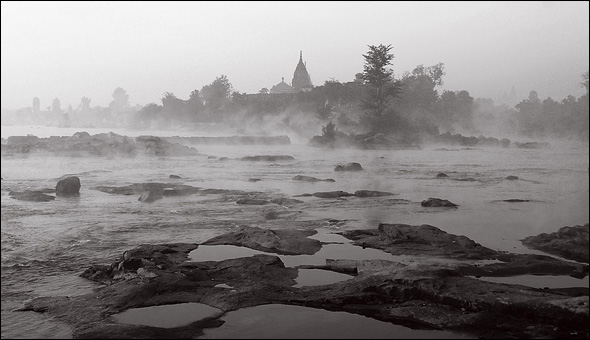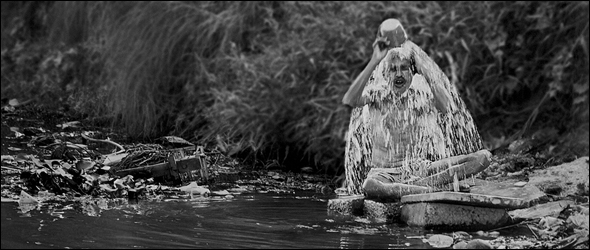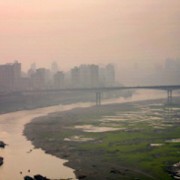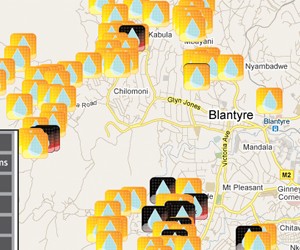First Approval in India’s National Plumbing Project, Despite Possibility to Endanger Tigers
The Ken-Betwa canal will transfer water between river basins in southern India.
India’s Ministry of Environment and Forests has approved ‘in principle’ the first canal in a water development plan that would link the country’s major river basins, creating two national plumbing systems, the Hindustan Times reports.
Former prime minister Indira Gandhi instated the National Water Development Agency to study the National River Linking Project (NRLP) in 1982. The NRLP divides India’s rivers into the northern Himalayan section and the southern peninsular section. There is a total of 30 proposed projects—14 Himalayan and 16 peninsular—that would transfer water from areas of perceived surplus to areas of deficit.
According to the Hindustan Times, the Environment Ministry approved the Ken-Betwa link after pressure from the Madhya Pradesh government.
By approving a 73-meter dam and a corresponding 230-kilometer canal that would divert water from the Ken River—a Ganges tributary—to the Betwa basin, the ministry has begun the first of 30 proposed river linkages.
After full approval, the Ken-Betwa project is expected to take nine years to complete. However, several studies on the environmental consequences must be completed before the project is fully authorized, according to the Hindustan Times.
Approval for the Ken-Betwa linkage—which will primarily supply water for irrigation in the Madhya Pradesh state, according to the National Water Development Agency’s terms of reference for the project—had been delayed for four years by the Environment Ministry’s expert appraisal committee, who had concerns that construction would submerge more than a square kilometer of the nearby Panna Tiger Reserve.
Additionally, some 46 square kilometers representing 8 percent of Panna National Park would be submerged by the same reservoir, which would regulate water flow into the canal.
Just last year, Environment Minister Jairam Ramesh spoke out against development projects that would harm nature preserves.
“We have many such threats that the tiger reserves face…but we are not going to simply compromise ecology security in the name of development,” Ramesh told Daily News and Analysis India.
Ramesh went on to say that he had already intervened and rejected two coal mining projects near the Tadoba Tiger Reserve in Maharashtra, which could be a preview of his intentions for the river-linking project.
The economical and ecological merits of the NRLP have been hotly debated in India, and the project was even canceled briefly in 2009, according to The Assam Tribune, after a change in government.
“It is easy to do interlinking on paper,” Ramesh said, according to the Indian Express. “Interlinking of rivers has limited basin value, but large-scale interlinking would be a disaster.”
The respective state governments have prepared detailed assessments of two other linkages and have signed memorandums of understanding, but the other 27 proposed projects have not been seriously considered. If the full project were to be implemented, it would require an enormous block of money—estimated at $120 billion—and would face opposition from social justice and environmental groups, as well as downstream neighbor Bangladesh, which argues that the project would deplete river flows.
Source: Hindustan Times, Daily News and Analysis India, Indian Express, The Assam TribuneNational Water Development Agency’s report on the Ken-Betwa linkage
Read more about river-linking plans in India on Circle of Blue.

Brett writes about agriculture, energy, infrastructure, and the politics and economics of water in the United States. He also writes the Federal Water Tap, Circle of Blue’s weekly digest of U.S. government water news. He is the winner of two Society of Environmental Journalists reporting awards, one of the top honors in American environmental journalism: first place for explanatory reporting for a series on septic system pollution in the United States(2016) and third place for beat reporting in a small market (2014). He received the Sierra Club’s Distinguished Service Award in 2018. Brett lives in Seattle, where he hikes the mountains and bakes pies. Contact Brett Walton












Why is it that we people in the East are SLOW to understand the massive ill effects of ‘harassing’ Nature, even when we see daily the terrible effects of such actions that happen today in the West , where projects like this were merrily carried out by crooked politicians and greedy businesses in the 50’s???
Surely we have a mind of our own that is not corrupted and enslaved to the dollar?
Let us wake up, Indians. Stand up for your national heritage and all the blessings of the land – we have a marvelous country, please let us NOT wastefully destroy Her.
Many will argue that well being of millions of people is more important than tigers.